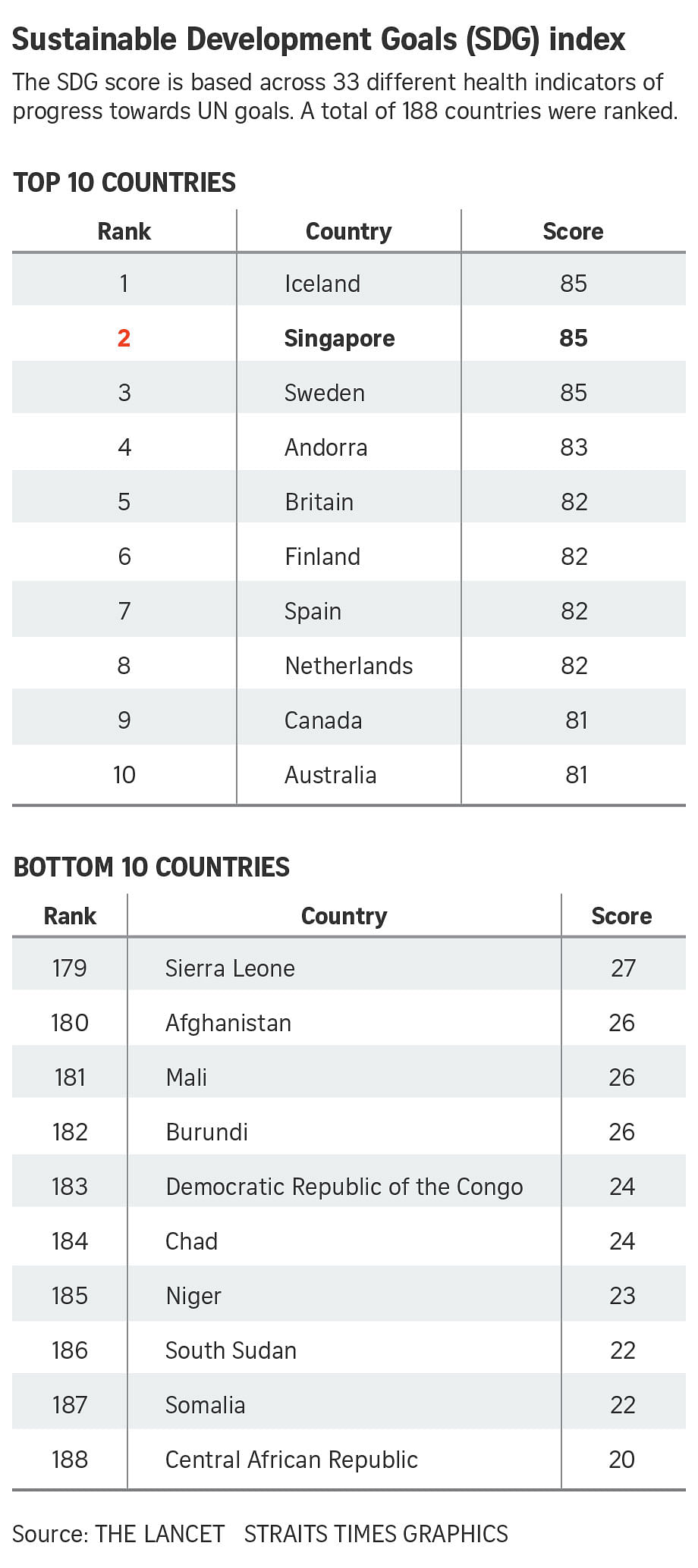Singapore among top countries in health and living standards: Lancet
Sign up now: Get ST's newsletters delivered to your inbox

Singapore has claimed top spot, together with Iceland and Sweden, in a health and living standards report published this week in the Lancet medical journal.
PHOTO: REUTERS
Derek Wong
Follow topic:
Singapore has claimed top spot, together with Iceland and Sweden, in a health and living standards report published this week in the Lancet medical journal, according to Bloomberg.
The latest report, perhaps the most comprehensive ever, also reveals the broad shortcomings of sustainable development efforts around the world.
According to health goals set by the United Nations, Singapore, Iceland and Sweden share the top spot in the list of 188 countries.
Using the UN's sustainable development goals as guideposts, which measure the obvious (poverty, clean water, education) and less obvious (societal inequality, industry innovation), more than 1,870 researchers in 124 countries compiled data on 33 different indicators of progress towards the UN goals related to health, reported Bloomberg.
Singapore scored an overall 85.3 on the Sustainable Development Goals (SDG) index, and was grouped the highest-scoring country together with Iceland (85.5) and Sweden (85.3). The median SDG index was 59.3 across the world.

Singapore scored a perfect 100 (where 100 indicated safe levels) in indicators such as disaster (death rate due to forces of nature), stunting (prevalence of stunting growth in children under age five), wasting (prevalence of wasting in children under age five), malaria, neglected tropical diseases, water and sanitation. It was also the only country to attain a perfect score in poisons (death rate due to unintentional poisonings).
Singapore scored the highest (98) in occupational risk burden, which indicated that it was best able to protect the labour rights and promote a safe and secure working environment for all workers, including migrant workers, in particular women migrants.
Children between the ages of two and four in Singapore are also less likely to be overweight than their counterparts in Sweden and Iceland, as Singapore's score of 62 was higher than the other two top-ranked countries.
However, Singapore scored a low of 62 for rate of hepatitis B incidence, the lowest among the top 20 countries. An anomaly was Singapore's score of 62 for death rate attributable to water, sanitation and hygiene, which was one of the lowest across the board, with most countries in the top 20 attaining a score in the high 80s at least.
Finally, its score of 55 for levels of PM2.5 particles (air quality) was one of the lowest in the top 20 countries.

The report also revealed the broad shortcomings of development efforts across the world as countries continue to struggle with issues of obesity, HIV, suicide, alcohol and air quality.
According to Bloomberg, in all regions of the world and across the economic development spectrum, the problem of overweight children has grown worse, the study shows.
The massive study emerged from a decade-long collaboration focused on the worldwide distribution of disease. About a year and a half ago, the researchers involved decided their data might help measure progress on what may be the single most ambitious undertaking humans have ever committed themselves to: survival.
The United States, the country with the biggest economy, came out surprisingly short on the study, ranking 28th overall, between Japan and Estonia.
Bloomberg reported that eradicating disease and raising living standards are lofty goals that have attracted some of the biggest names to philanthropy. Facebook founder Mark Zuckerberg and his wife Priscilla Chan, a pediatrician, on Wednesday (Sept 21) pledged US$3 billion (S$4 billion) towards the effort.
The new study itself was funded by the Bill & Melinda Gates Foundation. The 17 UN Sustainable Development Goals themselves are a successor to the Millennium Development Goals, a UN initiative that from 2000 to 2015 lifted a billion people out of extreme poverty, halved the mortality of children younger than five years old, and raised by about 60 per cent the number of births attended to by a skilled health worker, according to Bloomberg.
The research team scrubbed data obtained on dozens of topics from all over the world. For example, to make sure they had adequate data on vaccine coverage for each region, they looked at public surveys, records of pharmaceutical manufacturers, and administrative records of inoculations.
"We don't necessarily believe what everybody says," Christopher Murray, global heath professor at the University of Washington and a lead author of the study, told Bloomberg. "There are so many ways they can miss people or be biased."

